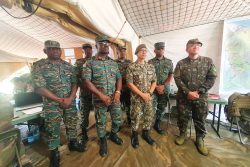Paramount among these is the generally poor performance of successive incarnations of the West Indies Cricket Board. In a very revealing recent interview in Kaieteur News by Colin Croft, former West Indies star Deryck Murray zeroed in on one aspect of this point by showing, in some detail, that we are simply not playing enough “learning” cricket across the region. He points out that there is no Intermediate “A” division cricket in the Caribbean, and cites the example of Australia with players involved in club, grade, state, one-day, 20-over, and Test levels of the game. In simple terms, compared with other cricket powers, the development apparatus of our cricket, in providing opportunities and coaching to develop cricket skills, is simply poor.
Certainly there are other day-to-day deficiencies to be attributed to the WICB operations – I referred to some two years ago in the song “Take A Rest” – but this absence of what used to be a cricket stream, starting from school-age players, properly coached, and flowing through the sport in a club/district/national web, culminating in Test level, is a principal one. Unless it is restored, we will continue to find the pool of proficient cricketers to be very low. The perceptible standard of our ability to simply play cricket has fallen so low as to cause Deryck Murray to sardonically say in his interview that “in the West Indies, if you make 15 runs you may get in the Test team.”
However the larger problem, and one we continually sidestep, is the composition of the Board itself. The historical Caribbean problem of insularity in regional matters – a clearly established fact even pre-existing independence – also stalks the halls of the WICB operations, and changing the President of the WICB changes nothing; Presidents come and go, but the national schisms remain. Insiders will tell you that one of the factors contributing to the seemingly haphazard moves or decisions in these WICB lapses (the list has been well documented) is not so much individual incompetence, but the morass of a board crippled by the narrow interests of its members each staunchly representing separate nations.
In simple terms, our regional WICB, made up of 13 countries, has the ingredients of friction and dissension built in. As Tony Cozier rightly pointed out recently, the fulminations of Board members have to do mainly with clamouring for their own players and agendas. The WICB has a built-in flaw: it is a single board with separate interests. (Before someone raises the point about the apparent cohesion of our early cricket boards, remember that much of that was in colonial times with a board technically accountable to one authority – England. With the onset of independence, the back-burner insular tensions within the WICB came to the front, starting with the Rousseau era, and later coming to the boil as the team’s fortunes declined. Indeed, it would be unreasonable to expect that the narrow national views leading to our various vexing regional frictions today – free trade; free movement of labour; CSME; CCJ – are not also present in the WICB deliberations.)
Another fundamental factor is the attitude of today’s players. Apart from the powerful money magnet, particularly evident in the burgeoning 20/20 game, the other aspect of our cricket teams now is that the players often come to the wicket lacking required skills, and while part of this can be attributed to the lack of a “learning the game” structure that Deryck Murray referred to, it seems the players themselves are not disposed to put in the personal time to become more proficient. The late Malcolm Marshall raised this flag many years ago, but not much notice was taken.
In the Caribbean we are given to placing reliance on our “natural talent”, when the reality is that the most gifted athletes in any sport you name are also the hardest workers. Michael Jordan, a star in his time in the NBA, would go back to the gym, even after a winning game, and shoot baskets alone for two hours to hone his “natural talent”. Just this week, a coach of the world famous golfer Phil Mickelson revealed that Mickelson prepared for the Master’s at Augusta, by going to the championship golf course two days before the tournament, putting in 8 hours each day, practicing his short game. Mickelson would take 10 shots from one spot; move 20 feet, take another 10 shots; another 20 feet, and so on until he had completed a circle of several hundred shots around the hole. Then he would do that for all 18 holes. Next day, the same routine. This is one of the top golfers in the world. Are any of our cricketers doing anything close to that?
Clearly many of our players are coming to the game lacking the essential technical grounding; it sticks out like a sore thumb when we go up against the world’s best as in the recent 20/20 championship in South Africa with Guyana representing the Caribbean.
In the Test arena, it is also clear that we have not honed the mental approach to the game, in both the strategy of the sport and in our personal focus. Time and again, established cricketers playing long innings, or a difficult innings facing penetrative bowling, will emphasize that it is not stroke play but concentration that gets them through; to the extent, as Boycott and Tendulkar have often said, of knowing what shots not to play, even when it’s the player’s favourite stroke. Our cavalier style of play certainly has its appeal, but some of our embarrassments in the game in recent years indicate that perhaps we have taken the “calypso cricket” approach too much to heart.
One cannot lose sight of the many other conditions impinging on the state of West Indies cricket today – competition from other sports; more selfishness among athletes; financial appeal of the shorter games; loss of national pride; etc. – but those conditions are largely second-tier concerns.
There are some hard first-tier realities facing us: one is that our players are not motivated, or perhaps not rewarded properly, to commit to the regimen of practice, of trial and error, that leads to professional heights being reached. Erratic WICB practices may have contributed to this condition, but ultimately great athletes are the fully dedicated individuals that our game of cricket clearly lacks today.
More critically, the present arrangement of one Board seeking to represent 13 differing national interests is not working. Furthermore, the various lapses besetting our regional cricket administration (lack of youth development structures; confusion over contracted players; uncertainty of tournaments; no declared cricket season; friction over Test selections;) can hardly be blamed solely on individual WICB staff incompetence.
Such critical and pervasive lapses are clearly the consequence of an organization adrift, and ultimately the likelihood of unity coming to that regional conglomeration is remote; if you’re not persuaded, read our history books and our daily newspapers.
Deryck Murray was involved for five years in regional cricket administration. He told Colin Croft: “What I have seen inside fills me with great disappointment that the system will ever allow itself to change. I see no hope for West Indies cricket in the near future.”
Looking at the picture of our game today, one finds it hard to disagree.










